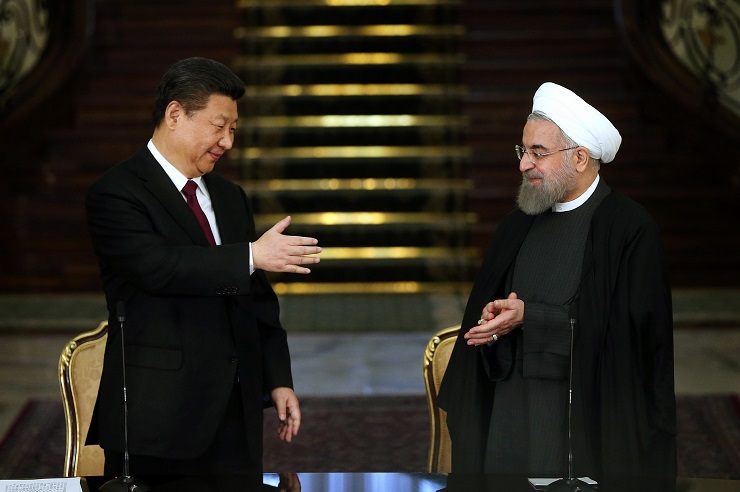The recently announced China-Iran deal, while a pact between two countries, is certainly an event of global significance, which will have far-reaching implications. Coming at a time when we already have a ‘US vs. rest of the world’ situation in the UNSC over arm embargoes on Iran, the fact that China, a super power already entangled in a ‘trade-war’ with the US, will be formally entering into a strategic alliance with Iran does send a strong message about how the global balance of power is shifting. Significantly enough, both China and Iran happen to be countries that the US has repeatedly called ‘grave security threats’ for their core national interests. Thus the ‘coming together’ of these two powers has already become an event which is being increasingly seen not just as an economic and trade pact—an extension of China’s Belt & Road Initiative—but a long-term strategic alliance that has economic, political and military aspects.
How the deal hits directly at the US interests is evident from the way China aims to invest billions of dollars in Iran’s energy sector, which has been the target of US sanctions for quite some time. As expected, the very announcement of the deal has already set off a chorus of ‘condemnation’ in the US; for, with China pouring billions of dollars in Iran, the latter will have an opportunity to ward off the impact of US sanctions and thus ensure its economic and political survival.
In other words, if the very purpose of US economic and financial sanctions on Iran was to force the regime to crumble, Chinese investment will make sure this doesn’t happen. In the same vein, if the very purpose of the US sanctions were to shut all doors of economic activity on Iran and cut if off from the rest of the world and thus force it to the negotiating table, this is almost certainly no longer a possibility.
This is an extensive plan. “This plan prepares the ground for Iran-China collaboration in key projects and infrastructural development, including the great Belt and Road Initiative. It is an opportunity to attract investment in different economic sectors such as industry, tourism, information technology and communications,” told Iran’s president, Hassan Rouhani, to his cabinet.
While this deal will not only surely indicate the failure of the Trump administration’s “maximum pressure” strategy, it will also prove that the Trump administration, despite its ambitious ‘trade-war’ with China, is unable to stem the tide of the latter’s development and rapidly expanding global reach. The Trump administration had plausibly reached a conclusion earlier this year that the origin and spread of COVID-19 from within China has crippled its economy and that a renewal of ‘trade-war’ will ‘nip the Chinese evil in bud’ for good.
Indeed, this was a part of larger strategy that first aimed at decoupling the US economy from the Chinese. According to a recent report of Bloomberg, the Trump administration’s strategy is similar to what the Obama administration did when it first imposed sanctions on Iran. Back then, it forced groups and companies and banks to divest resources away from the Iranian banks and companies. It is doing the same vis-à-vis China. Since April, the Trump administration has been warning federal pension funds against investing in indexes whose portfolios include large Chinese companies. This is how the Trump administration aims to ‘protect’ the US businesses from sanctions. The US’ potential decoupling aims at paving the way for turning China into another Iran.
The fact that the Chinese continue to make progress and are entering into new pacts means that China is already far stronger than the US seemed to have (wrongly) calculated. It is already too strong for the US to become an easy prey.
Importantly enough, the US is increasingly alone in its ‘war’ on Iran and China. Its most trusted ally, Europe, has already chartered a different course both towards China and Iran. The US, as even a Washington Post report stated, is already a ‘coalition of one’ with not enough power at its disposal to effectively challenge the Iran-China alliance. The UN, which the US has been trying to strangulate over the question of sanctions on Iran, has already declared the killing of General Soleimani as “illegal”, denting further the US ability to influence and shape the outcomes of events to its own advantage.
The US is increasingly facing a global isolation—something that directly cuts at its unilateral domination of the global system since the end of the cold war. Whereas part of the reason for this increasing isolation is the US’ own stubborn attitude, a crucial reason for this isolation is also the way the world has already largely changed and matured into a multipolar system.
In this context, the coming together of Iran and China does not just indicate a further expansion and consolidation of China’s BRI; it also shows how US unilateralism is increasingly becoming irrelevant and absurd in today’s multipolar world. Its sanctions not only receive no recognition but are being very consistently brushed aside by Europe and China alike.
Salman Rafi Sheikh, research-analyst of International Relations and Pakistan’s foreign and domestic affairs, exclusively for the online magazine “New Eastern Outlook”

